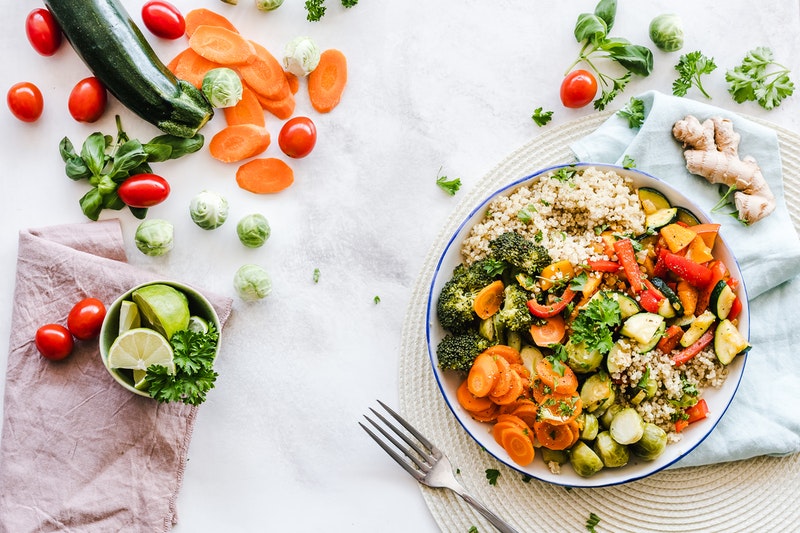Are you thinking about counting calories to lose weight? If so, you need to know these four things.
Many of us believe that counting calories (and cutting them back) is an important part of losing weight. When it comes to weight, the amount of calories we eat does count, however, obsessing over them can potentially get in the way of us forming healthy long-term habits that are more effective for long-term weight management. The traditional notion of “calories in calories out” is a lot more complicated than it has been made out. Consider the following before counting those calories too closely.
1. Are you eating intuitively?
Intuitive eating promotes a healthy attitude towards food. The idea is to eat only when you feel hungry and stop when you feel comfortably full (not overstuffed like after Christmas lunch). You would think this to be intuitive, but for many of us it simply isn’t, and we eat for many other reasons than hunger. Eating intuitively can be useful when watching our weight. Counting calories on the other hand, relies completely on external rules and numbers rather than teaching us to respect our body’s internal cues.
How to get back in tune with your tummy
Both practise and time will help you relearn those internal cues. Try to slow your eating down. Remember, it can take up to 20 minutes for the stomach to signal your brain that it is full. Sit at the table and avoid distractions like TV, phones and books. Put your fork down between mouthfuls, don’t have it loaded up waiting to go while you are still chewing. Chew your food well and savour the flavour and textures. How does that piece of chocolate taste when you keep it in your mouth for longer? It might be sweeter than you expect. You might not enjoy it as much as you thought.
2. Be flexible
Our hunger and energy levels change from day to day. Some days we eat more and some days we need less. Many factors impact how much food we need and how hungry we feel—such as sickness, stress, outside temperature, amount of sleep we have had or a big gym workout. Only allowing yourself a set level of calories each day may lead to depriving your body of what it really needs to thrive and function at its best.
3. Nourish your body with whole, plant foods

When counting calories, it is easy to forget that foods are wonderfully complex and should be chosen for all their health-giving qualities (not just their low caloric count). Rather than eat to reduce calories, eat to increase fibre, vitamins, minerals and phytonutrients. Choose food for its colour, aroma and texture.
Counting calories disregards the fact that many healthy foods (that we should be including daily), like nuts, seeds and avocados, are naturally higher in calories, while supplying valuable heathy fats, vitamins and minerals.
Interestingly, our bodies use foods in ways that are far more complex than simple calorie counting can account for. Gut bacteria, how well we chew, food processing and cooking can all determine how many calories you actually absorb from what you eat. Nuts, like almonds, are a good example of this. When eaten by the “average” person, a lower amount of calories are taken on board rather than the higher amount written on the label.
4. Foods don’t have a “moral value”
Counting calories may lead to labelling foods as either “good” or “bad”, which then leads to guilt or shame while eating those foods. Always talk about food in a neutral way, especially when we are with our kids—avoid telling them that “Mummy has been naughty because she ate the chocolate cake”. Rather, label foods as “everyday” (fruit, veg, nuts and legumes) or sometimes foods (chocolate cake). It’s the habits around those foods that are more important.
Read: What having kids taught me about my relationship with food
Model to your kids that you can enjoy a sustainable and flexible relationship with treat foods. You can give yourself permission to enjoy a small amount of a treat food today, because you know that food will always be around another day to enjoy.
Finally, eating to manage your weight needs to be sustainable in the long term. The way we eat should be able to accommodate the unexpected as well as those celebratory times in life. It should be varied, flexible, enjoyable and of course nourishing. Guilt, shame and being “at war” with food and your body isn’t helpful and won’t take you to a place of health and happiness.
How helpful was this article?
Click on a star to rate it!
5 / 5. 1
Be the first to rate this post!
Marcia Townend
Related posts
Subscribe
Receive personalised articles from experts and wellness inspiration weekly!

